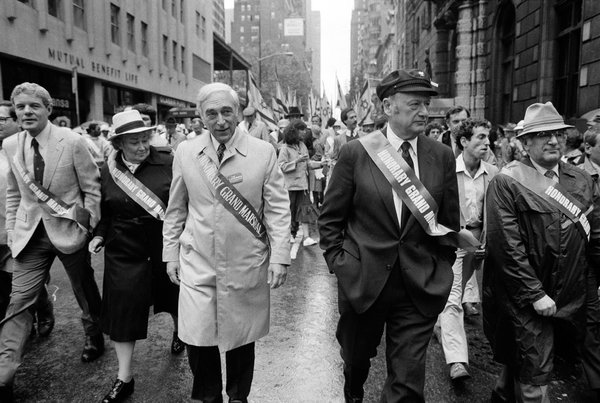Frank Lautenberg, New Jersey Senator in His 5th Term, Dies at 89
Frank R. Lautenberg, who fought the alcohol and tobacco industries and promoted Amtrak as a five-term United States senator from New Jersey, died on Monday in Manhattan. He was 89.
The cause was complications of viral pneumonia, his office said. In 2010, it announced that he had stomach cancer. Though he and his doctors expected a complete recovery, Senator Lautenberg, a Democrat, decided not to seek re-election next year.
His death leaves a vacancy in the Senate that will be filled by Gov. Chris Christie of New Jersey, a Republican. If the governor appoints a Republican, as expected, his party will hold 46 Senate seats while the Democrats’ number will drop to 52. Two independents caucus with the Democrats.
Mr. Lautenberg was the Senate’s oldest member and last surviving veteran of World War II. He had been frequently absent from the Senate in recent months because of failing health but did appear in April in a wheelchair to cast votes in favor of tougher gun-control measures, which were defeated.
First elected in 1982 at age 58 after a successful business career, Mr. Lautenberg served three terms, retired and instantly regretted the decision. When Senator Robert G. Torricelli made a last-minute decision not to seek re-election in 2002, Mr. Lautenberg ran in his place and won the seat. He was re-elected in 2008.
Never a flashy senator — his colleagues Bill Bradley and Mr. Torricelli got more attention — Mr. Lautenberg acquired influence on the Appropriations Committee and had a consistently liberal voting record. Americans for Democratic Action said he had voted liberal 94 percent of the time.
Mr. Lautenberg’s first major victory came in 1984. A freshman senator in the minority party, he pushed through a provision to establish a national drinking age of 21, a measure that threatened to cut 10 percent of a state’s federal highway money if it did not comply. He argued that the change would save lives by ending “a crazy quilt of drinking ages in neighboring states” and prevent those under 21 from driving over “blood borders” to get drunk and then try to drive home.
“He had to fight like hell to get it through,” Jay A. Winsten, associate dean of the Harvard School of Public Health, said in an interview. “The estimates are that the cumulative lives saved are in excess of 25,000.”
Mr. Lautenberg followed that move 16 years later with another condition on highway spending: States must designate 0.08 percent blood alcohol as the level that would constitute being drunk.
In 1989, he led a successful fight to ban smoking on all commercial airline flights. Mr. Lautenberg, once a two-pack-a-day smoker, told the Senate: “With this legislation, nonsmokers, including children and infants, will be free from secondhand smoke. Working flight attendants will avoid a hazard that has jeopardized their health and their jobs.”
He later pursued legislation that prohibited smoking in federal buildings and in all federally financed places that serve children.
Mr. Lautenberg’s other legislative achievements include a 1996 law denying gun ownership to people who have committed domestic violence. He was also the author of legislation requiring that by 2012 all cargo destined for United States ports be screened for nuclear material, a requirement that both the Bush and the Obama administrations said could not be met.
Passenger railroads were another priority of the senator. He won an important victory in 2008 with legislation that nearly doubled Amtrak’s subsidy, and he advocated for federal money to help build another commuter rail tunnel between New Jersey and Manhattan. When Mr. Christie killed the tunnel project in 2011, saying it was too expensive, Mr. Lautenberg, who was a critic of the governor, said the move “will go down as one of the biggest public policy blunders in New Jersey’s history.”
Another Lautenberg measure gave refugee status to people from historically persecuted groups without requiring them to show that they had been singled out. The senator estimated that 350,000 to 400,000 Jews entered the United States under that 1990 law. Evangelical Christians from the former Soviet Union also benefited from the law.
Mr. Lautenberg had never held elected office before running for senator, but he immediately took to the sharp style of New Jersey politics. His entry to the Senate and his return were preceded by scandals involving another Democrat. In 1982, Senator Harrison A. Williams Jr. resigned after being convicted of bribery in the federal corruption investigation known as Abscam. In 2002, the Senate Ethics Committee declared that Mr. Torricelli was “severely admonished” for failing to report gifts from a contributor while helping the contributor’s business through official acts. Mr. Torricelli quit the race six weeks before the election.
Campaigning was rough in Mr. Lautenberg’s first two races. In 1982 he implied that this opponent, Millicent Fenwick, a 72-year-old moderate Republican who had clashed with President Richard M. Nixon, was too old. He called her “eccentric” and offered doubts about her “fitness.” He won an upset victory with 51 percent of the vote.
In 1988, he and Pete Dawkins, a former West Point football star and Vietnam War hero, slugged it out with blunt and sometimes provably false campaign television advertisements. “Gladiator sports are in,” Mr. Lautenberg observed. He won with 54 percent.
Mr. Lautenberg contributed heavily to his own campaigns, using the wealth he had gained after joining with two boyhood friends to develop a payroll services company, Automatic Data Processing, now better known as ADP.
Mr. Lautenberg was a strong backer of motorcycle-helmet laws. Mark V. Rosenker, a former chairman of the National Transportation Safety Board, recalled on Monday that the senator had kept a broken helmet in his office and showed it to visitors.
“He was skiing and he hit a tree or a rock or something, and that thing broke open like an egg, and it saved his life,” Mr. Rosenker said.
Frank Raleigh Lautenberg was born in Paterson, N.J., on Jan. 23, 1924, to Sam and Mollie Lautenberg, Jewish immigrants from Poland and Russia. The family was poor. His father repeatedly tried to start up small businesses, returning to work in Paterson’s silk mills when the ventures failed.
In 2000, Mr. Lautenberg accompanied a reporter for The Star-Ledger of Newark to a long-closed silk mill. “My father took me in there one time and told me to look around,” he told the reporter. “He said you must never work like this. He said you have to get an education. I was 12; it didn’t mean a lot to me at the time. But it must have sunk in, because I did get an education. I didn’t want to work and struggle like he did.”
Mr. Lautenberg served in the Army Signal Corps in World War II and, after his discharge in 1946, used the postwar G.I. Bill of Rights to attend Columbia University, graduating in 1949. That experience, he said later, made him a strong supporter of the G.I. Bill enacted over Bush administration objections in 2008. The measure sharply increased educational benefits.
He briefly worked for the Prudential Insurance Company, but in 1952 approached Joe and Henry Taub, the classmates who had only recently started the payroll firm. Mr. Lautenberg persuaded them to hire him to sell the company’s services.
When he joined the company, he was its fifth employee. But it grew rapidly, and by 1982, when he left the company as its chief executive, it was one of the largest computer service companies in the world, with 15,000 employees.
He is survived by his wife, the former Bonnie Englebardt, whom he married in 2004; 4 children from his first marriage, to Lois Levenson, which ended in divorce in 1988: Nan Morgart, Ellen Lautenberg, Lisa Birer and Josh Lautenberg; 2 stepchildren, Danielle Englebardt and Lara Englebardt Metz; and 13 grandchildren.
As a boy Mr. Lautenberg did not have a bar mitzvah because his family’s poverty and frequent moves precluded joining a synagogue. But after he became aware of the Holocaust during the war, he began to contribute to Jewish causes. In 1968 he established the Lautenberg Center for General and Tumor Immunology at the Hebrew University Medical Faculty in Jerusalem. He served as president of the American Friends of Hebrew University, was a member of the Jewish Agency for Israel’s board of governors, and from 1975 to 1977 was general chairman of the United Jewish Appeal.
He also began donating money to Democratic candidates, including $90,000 to George McGovern’s presidential race in 1972, the last before there were effective limits on individual contributions.
When asked once why he had decided to enter politics at 58, he said he had been giving money to liberals like Mr. McGovern, Birch Bayh, Edward M. Kennedy and Gary Hart. “If I’m willing to support them,” he asked rhetorically, “why shouldn’t I support myself?”
http://www.nytimes.com/2013/06/04/nyregion/frank-lautenberg-new-jersey-senator.html?pagewanted=all&_r=1&#h[]


